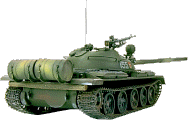Robert Thibault - World War II French Soldier, 1939-1940, page 2
Grandpapa - On Time All the Time
Grandpapa is an incredibly punctual man. He's never late for anything. Anything at all. And everything has to be precise to the minute. If, for instance, the train in Coulommiers will leave in 15 minutes then we must absolutely leave the house 12 minutes before that time. The warnings start much earlier with wake up calls, then checks to make sure if I am getting ready on schedule. Of course one of the big jokes in the family is that punctuality skips every other generation, or at least it skipped Mom after having gotten Grandpapa. Another key difference between the two of them is that he is incredibly meticulous about where he puts everything.
In my younger days, when we were about to leave on yet another journey would tell him something like "Grandpapa, we'll be back from Norway on July 12 at 1:30 pm."
"1:30 pm on July 12," he would echo back, matter of factly to let us know that he had received and understood the message. "Okay, so I'll be there at 1:30 pm on July 12." We would nod our heads, smile and get ready to leave. We would go off to Norway for five days, come back to Paris and then to Coulommiers by train. He would arrive just as the train was pulling in. We would get out of the train, see him pulling up, and know that we were on our way to a hot meal and a comfortable bed. This was back in the '80s, before cell phones, so such planning ahead was absolutely necessary.
My Grandfather is truly a creature of habit brought on by genetics and cultivated through years of being in control of everything that was his. And he is, or at least was, used to being in touch, having run his small factory for four or five decades and having been Mayor of Saints for 20 years - 1946-1965, longer than all but one other mayor of Saints. He'll say that one of his attributes is that he listens to others and doesn't always assume that he is right. But that is outside of the house and outside of the factory. If anyone crosses him in either of those two places, then they're asking for it. A villager who knew my grandfather once said "He didn't say much, but when he did, everyone listened."
One of my favorite habits when I'm in France is to get out of bed at around midnight, just after it has finally gotten all nice and warm under the sheets. The stained wooden stairs creak in a couple of places as I thread my way down, gingerly stepping on every third or fourth step to minimize noises that might awake others. I know the path of least noise, but I have never found a way to get down without at least two serious creaks. The landing is a pattern of cold blue and white tiles set on top of colder concrete. The landing puts me in front of the door to the kitchen which also opens with the loud clicking noise of the door knob turning. Inside the kitchen, one cupboard after another clicks loudly no matter how hard I try to avoid it when the magnets make contact as I go after croissants, 100 gram tablets of rich, dark chocolate, instant chicoree coffee and of course, bowls, plates, and spoons. And of course they are scattered in different cupboards, so my snacking sets off three or four loud magnets. Grandpapa is selectively deaf with or without his hearing aid, so who knows if he hears me at night or not. My presence downstairs is always without evidence or witness, but the next morning, Grandpapa would always notify after I came down for breakfast with "I counted the bowls this morning. And I'm missing one. And also a little spoon and a plate." A simple mea culpa doesn't cut it. No, this daily ritual requires that I turn around, go back upstairs and procure the offending objects. Or at least it used to since now he's beginning to mellow and no longer admonishes me. Regardless, the chocolate and croissants are always magically replenished every couple of days.
The War
Anyway, with me he opens up and talks about family, the war, and other experiences. Fortunately for me as a historian, the war comes up all too often. If it isn't WWI, then it's WWII. My generation is truly the spoiled generation since we haven't had one or two global wars to impact our collective pysches.
The house is big and solid with walls that are stone and mortar and about 12-18 inches thick. It's three stories high. The main floor is in the middle. We went into the formal dinning room, which consists of a overstuffed burgundy sofa, a large Louis XV style marble topped bureau surmounted with shooting trophies, and a beautiful carved wooden dinning table with wicker bottom and backed chairs for six. Photographs on the wall are mostly of my grandparents, my mom, my girlfriend Lil. My friend Bill Passmore makes a cameo appearance in a photo with me. The wall-mounted clock marks the passage of each 15 minute interval with the appropriate Big Ben chime. The knob operated radiator along the wall is a reminder of how cold parts of the house used to be before he got centralized heating a few years ago. I get out the microcassette recorder and the latest large red Michelin map of France, place both on the table and start to quiz him at length. Occassionaly a car passes by on the road, practically the only one in Saints, and makes a huge whooshing sound much like bicycles make as they go by on Sunday mornings.
I don't know how long Grandpapa went to school. I know it was at least until he was 12, but perhaps up to the time he was 16. I don't believe that it was any longer than that. As soon as his schooling was over, he would have started working at the small brick and tile factory that was my great grandfather's at that time. That's the tradition: the sons work in the father's factory. Eventually it gets passed down to the eldest son.
Grandpapa started his military service in 1927.
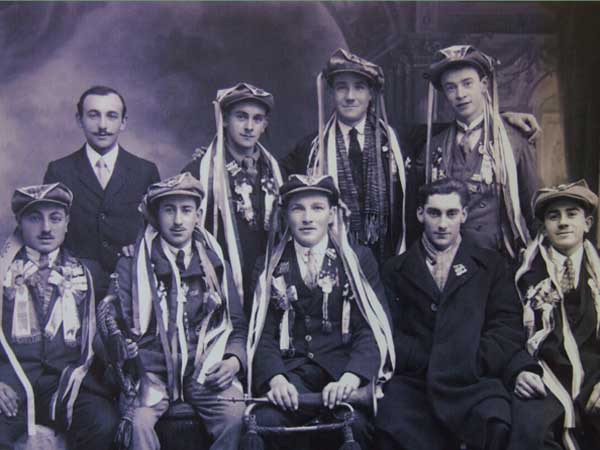
Robert Thibault (bottom row, without ribbons)
"And I was a soldier at that time in '27." All the boys in the village of a given age were mobilized at the same time. So my Grandfather was mobilized with guys he already knew and was probably great friends with. He wasn't feeling well, so he didn't pass whatever the first round of certifications was and thus sits a bit dejectedly in the "graduation" photo. He had previously explained to me that he was trained in radio communications. In 1927. That must have been pretty advanced technology in its day.
"I completed EORs, Eleve Officiers de Reserve" - meaning Student Officers of the Reserve - which must be the equivalent of a non-commissioned officer. I don't know my ranks well and didn't know the word for rank to ask him to clarify. "And so after I finished, I went to do 15 day reserve periods at Armand(sp?), Reims, and we did maneouvers, etc."
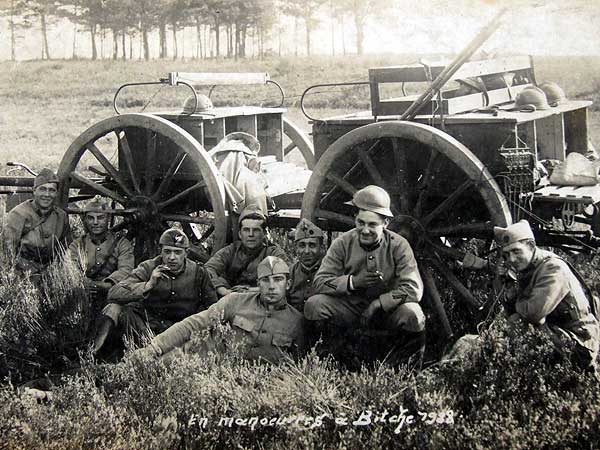
Robert Thibault and men from his artillery unit, on maneouvers, 1927-1928. He is the one clowning around with his helmet sitting sideways atop his head.
[Note: I don't know how to read French uniforms, but a photo of him from when he was in the army in 1927-1928 is labeled with the photo studio's name 'R. Wuuderliot' or something like that in Hagenau. And his collar tips have the number 12 on both sides. The French 12th artillery regiment is based in Hagenau to this day, so I can only assume that he was in the 12th regiment when he finished his EOR in 1927-1928.] Photos from this period show him on maneuvers with his unit in Bitche in 1928. He has two stripes on his sleeve, a cigarette pinched between his index finger and center finger. He is clowning around - his helmet is on sideways and he has a big closed mouth grin across his face. In the black and white photos, it is hard to tell what color the stripes are, but they are probably green which would indicate a non-comissioned status as a corporal.
"So for how long where you in the reserve?"
"Until (I was) 40 years (old), at least. I finished my EOR exams, then I could go into either teaching or attend the great school of military administration, or there were others who had military careers. So I, when I was mobilized, I was twenty and a half."
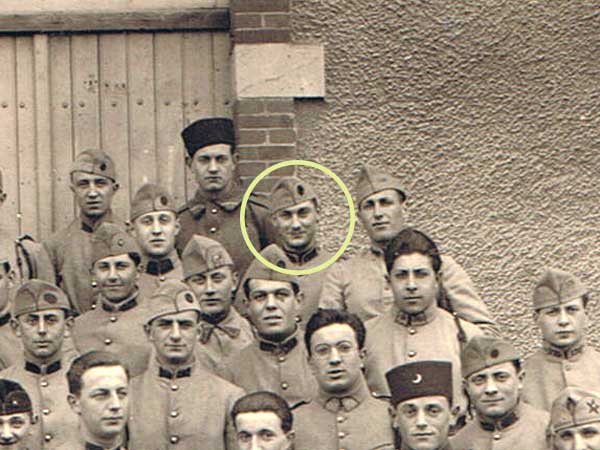
Robert Thibault (circled) - March 8, 1928
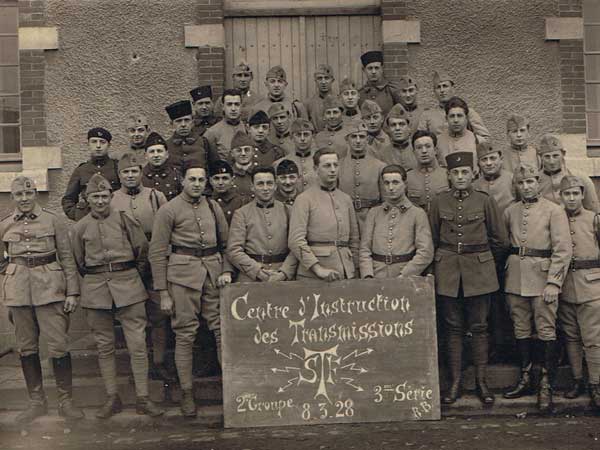
Robert Thibault (back row, at right) - March 8, 1928
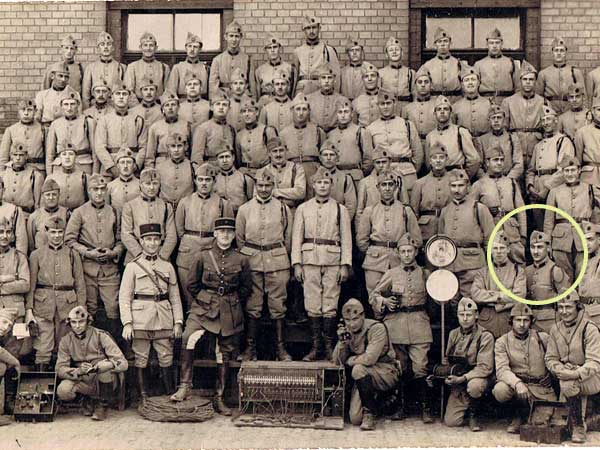
After training in actual military service.
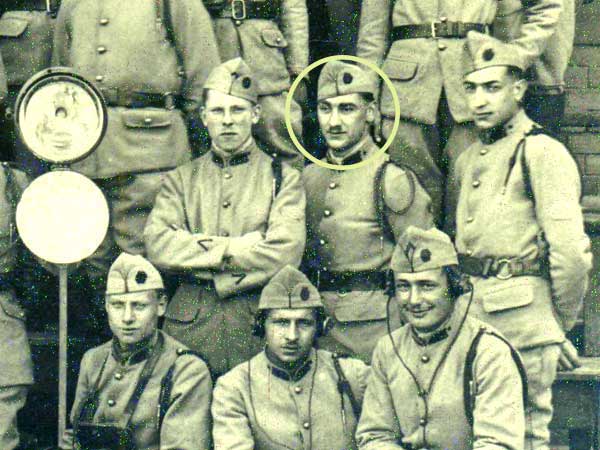
Robert Thibault (back row, at right)
He starts off by talking about the time he helped someone else dig up someone who had been buried. They dug him up only to find out that he wasn't dead. "The big guy was still alive. Ah oui." I only caught the tail one of that one and decided to move on to other subjects. We stood over the Michelin map of France, completely unfolded and covering up half the table. The four of us could have been army generals plotting a campaign for the attack of France, which is only appropriate since the next topic on our agenda was World War II.
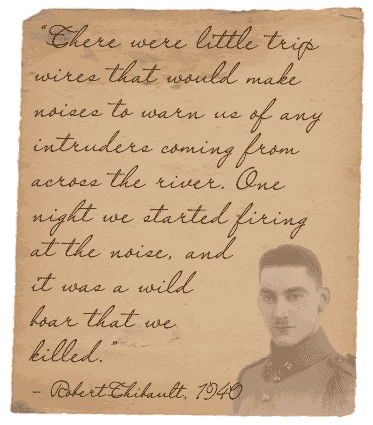 "Forbach... Saarbrucken. We could see across the frontier. We had the materials with which to do so." His fingers trace slowly across the map as he searches for the towns of his past, hesitating occassionally to ask one of us if the town he is pointing to is what he thinks it is. And he stops at other times to complain about how difficult it is for him to read these maps. His finger lands in the middle of the triangle described by Luxembourg, Metz and Saarbruken - part of the northeast corner of France that abuts Germany. "Boulay. Here. Next to it. So there was the river and between the river and the Boches and us, there was barbed wire. There were also little trip wires that would make noises to warn us of any intruders. We would exchange fire back and forth across the river. I didn't fire. I already had enough to occupy me. Eh bien mon vieux, one time at night we started firing at the noise, and it was a wild boar that we killed. But we didn't know what it was; we thought that it was the Boches." He reminisces continously about his friends from Germany of the post-War era. They are always friends, and friends first. He never even mentions the fact that they are German except by way of saying what city they live in. He references Kate and Otto at times around the dinner table, but he never calls them "my German friends" or anything like that. But when it comes to the faceless Germans during the war, it's always "les Boches" - short for cabageheads, which is roughly analagous to an American war veteran referencing Hitler's soldiers as "the Krauts". Old habits die hard, especially anything which is stored deep inside his memory banks from that era.
"Forbach... Saarbrucken. We could see across the frontier. We had the materials with which to do so." His fingers trace slowly across the map as he searches for the towns of his past, hesitating occassionally to ask one of us if the town he is pointing to is what he thinks it is. And he stops at other times to complain about how difficult it is for him to read these maps. His finger lands in the middle of the triangle described by Luxembourg, Metz and Saarbruken - part of the northeast corner of France that abuts Germany. "Boulay. Here. Next to it. So there was the river and between the river and the Boches and us, there was barbed wire. There were also little trip wires that would make noises to warn us of any intruders. We would exchange fire back and forth across the river. I didn't fire. I already had enough to occupy me. Eh bien mon vieux, one time at night we started firing at the noise, and it was a wild boar that we killed. But we didn't know what it was; we thought that it was the Boches." He reminisces continously about his friends from Germany of the post-War era. They are always friends, and friends first. He never even mentions the fact that they are German except by way of saying what city they live in. He references Kate and Otto at times around the dinner table, but he never calls them "my German friends" or anything like that. But when it comes to the faceless Germans during the war, it's always "les Boches" - short for cabageheads, which is roughly analagous to an American war veteran referencing Hitler's soldiers as "the Krauts". Old habits die hard, especially anything which is stored deep inside his memory banks from that era.
"The little river here, next to the frontier. Bouzonville. We were at Bouzonville. Ah you know, it was something. The headquarters was at Thionville, and we were out in the nature. Alors, we were just at the end." He straightens up away from the table and turns to address me directly, as if giviing a lecture. The image of the general is now gone, replaced again by that of grandfather as a non-military person, the way it seems he's always been. The pretty city of Thionville has flipped back and forth historically along with the rest of Alscace Lorraine. It was in German hands after the Franco-Prussian War of 1870-1871 and remained German property until 1918, when it was returned to France as part of the terms of the Treaty of Versailles. Recognizing its importance as a border town between France and Germany as well as the gateway to Luxembourg, the Germans built three forts around Thionville. Most places kept their names regardless of the changes in ownership. So Metz remained Metz as it ping-ponged from France to Germany and back to France. But the Germans renamed (or perhaps simply reverted) Thionville to "Didenhofen". I spent a couple of nights in Thionville and mostly remember being impressed by how the autoroute highway had been tightly wrapped around one end of the lovely gothic church or cathedral - practically right up against the precious monument. I guess space was rather tight. The city built up around a Merovingian castle named Theodonis Villa and was frequented by Charlemagne himself. Over time, it was controlled by Luxembourg, Burgundy, the Hapsburgs, the Low Countries and Spain before becoming Frenchy in 1659.
"I was in the 8th Division. [Note: This was apparently part of the French Second Army Group, French 3rd Army (led by General Conde) responsible for holding the Maginot Line from Montmedy to Strasbourg.] You had the Army Corps, underneath that the Division and then underneath that the Regiment. I was in the 12th Artillery Regiment. We had different unit types within the regiment. Foot soldiers, artillery, cavalry. Everything possible. Our guns were pulled by horse."
"Did you have horses or trucks to pull the cannons?" I asked just trying to confirm what I was envisioning in my head.
"No, no, no, we had horses. We were at fixed points, so mobility wasn't really possible; we never thought that the Germans would come there." Oh, ho, he laughs, a sad laughter of disbelief mixed with a feeling of foolishness that they were so easily outsmarted. "We were peaceful, but they came around and flanked us. They made the whole tour to come here."
For the French, defending this region was not only a matter of pride, but also extremely practical. Lorraine was France's main steel producing region, for instance.
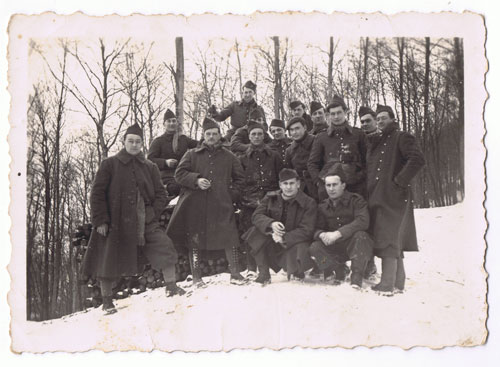
My Grandfather Robert Thibault (back-left with scarf) New Years Day, 1940, at the front lines. Yes, it was the Phoney War.
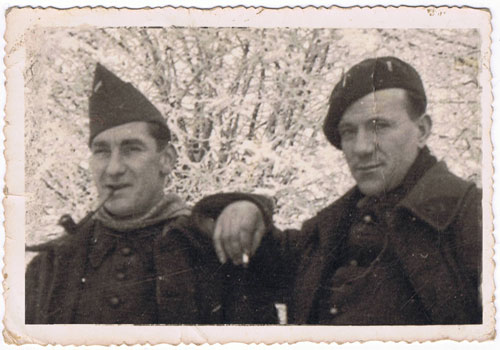
My Grandfather Robert Thibault (left) and a friend, New Years Day, 1940.
"So there I was placed in to a regiment, the 12th Artillery, which I did for one year and a half."
"How many soldiers were there?"
"I don't know. There were nine batteries. There were those in charge of horses, those in charge of this and that. I don't remember. Perhaps 300 men? I don't remember."
"And how many were under your command?"
"I was in charge of my battery. There were nine in the regiment." The big ben chime of the wall mounted clock tries to interrupts our conversation, but he just raises his voice to be heard above the din. I do the math: 300 divided by 9 would be 33 or so.
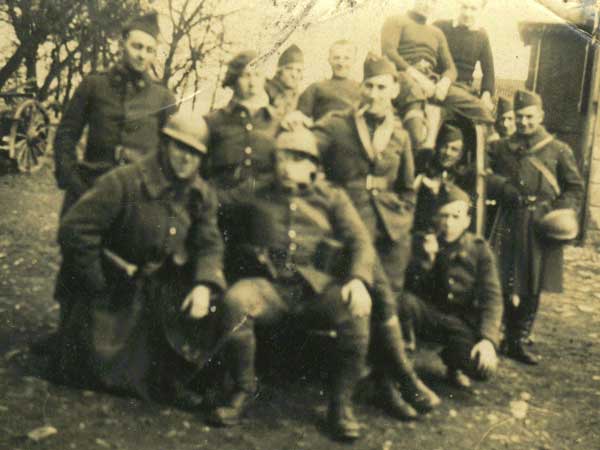
part of 12 Artillery Regiment, 8th Division, French army. Robert Thibault with cigarette in center.
"You had 45mm guns?"
"We had 75s." That the measurement is in milimeters is understood. "Because, voila, the 12th Artillery, was a battery of the 8th Division. The 12th Artillery was the light artillery of 75s, and the 112th Artillery had 155s, and we certainly didn't have any of those. The light artillery was in front, and the heavy guns with their longer range were in back. Yup, those were 155s." He shakes his head from side to side in a gesture that is either one of amazement at how powerful those guns were in their day or at how useless they were during the German onslaught. In theory, the crew of a gun included two men to aim the gun - one set the azimuth and the other the elevation, another to load, one or two men at the ammunition limber to set fuses and hand the shells to the loader.
The Canon de 75 1897 - as the 75mm gun was properly designated - had been quite famous for quite some time. It was a national secret from the time that it was invented in 1897 - and thus more than 40 years old by the time Grandpapa's unit had them. Even when the Americans had been given 75mm guns during World War I, the French insisted on handling the maintenance themselves. Over the years, the design had held up well, and it was still quite good for light field artillery. What the French had figured out is that by using the exhaust gases of the shell being fired to cock a hydro-pneumatic cylinder, they could put the gun back in its original position for it to be ready to fire again immediately. It was the world's first quick firing cannon: coupled with the Nordenfelt breech block, good crews could put up to 25 aimed rounds a minute down range. It was used extensively in World War I, not only in its standard form as artillery, but was also mounted as a gun in early French Schneider and St. Chamond tanks. By World War II, the gun had been classified as a light towed field gun in spite of its 1970 kb (4344 lb) weight. Several thousand were still in the French inventory in 1940, some of which had been modernized with pneumatic tires though most of them were still riding on their original wooden wheels. The gun was outclassed in general by German guns in World War I, but it was still used throughout the war. And the gun was further out of date by World War II, but France used it. Harry Truman commanded an artillery unit equipped with 75mm guns during World War I. According to "The World's Great Artillery", Truman's unit was firing at rates of up to 30 rounds per minute until "the guns became so hot that they were draped with wet blankets to cool them off." And even the US used it through 1941 and beyond, using them in the Phillipines against the Japanese. The 75mm guns were also mounted as anti tank guns to create the M3 Gun Motor Carriage and probably served as the basis for the 75mm guns used in Grant tanks and later Sherman tanks. Other users included Great Britain (small numbers), Poland, Romania, Greece and Lithuania.
Quite ironically, for irony is the bitter mistress of historians who think in black and white, the quick firing mechanism was actually based on the patent of a German named Konrad Haussner.
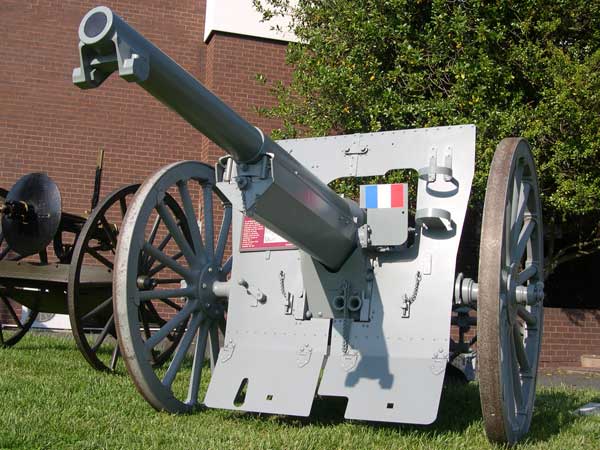
French 75mm gun at Aberdeen Proving Grounds.
"How many cannons made up a battery?" I always imagine about 10 guns firing in unison under command of an officer getting firing coordinates from air-based spotters. But then again, the French lost air superiority rather quickly in the six week campaign which crushed France.
"A battery, that was four cannons."
"And how many to man each gun. Six?"
"Oh yeah, there was already one to command the battery, then there were two aides, and I don't remember any more how many there were for all of the guns. But at each of the individual guns, there was a firer, a loader, one to aim" he laughs, "...there was a crowd, you know." His numbers don't add up to the five that I have read about elsewhere, which may be explained by his division being a reserve division and thus short on manpower.
Previous Page | Next Page
Robert Thibault, French Soldier
Robert Thibault, French Soldier, page 1, 1907-1997
Robert Thibault, French Soldier, page 2, 1928
Robert Thibault, French Soldier, page 3, 1939-1940
Robert Thibault, French Soldier, page 4 - Liberation of Coulommiers, France, August 27, 1944
Francais
Italiano
Espanol
Deutsch
Related Links
- United States Air Service in World War I at www.usaww1.com
- My travelogues of France, USA, Canada, UK, Japan, Saudi Arabia, etc.
- Thibault Villa
- 3rd Armored Division History Foundation
Keywords
12ème RA 1940
12ème Regiment 1940
12ème régiment artillerie 1940
8e Division
8ème Division D'infanterie
12ème Régiment d'Artillerie (3ème Armée, 8ème Division D'infanterie)
8ème Division D'infanterie infanterie
Phoney War
French army, 1939-1940
EORs, Eleve Officiers de Reserve
Quentin Roosevelt
1st Pursuit Group
American Air Force in France
American Air Force World War I
3rd Armored Division
Robert Thibault
Alcee Thibault
Raymond Thibault
Louis Thibault
Louis Toussaint Thibault
Louis Guyot
Titi Regnier
Regnier, Meung sur Loire

 Home
Home Hearts of Iron
Hearts of Iron


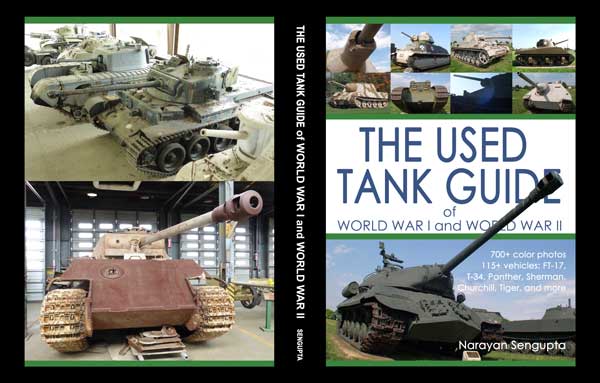

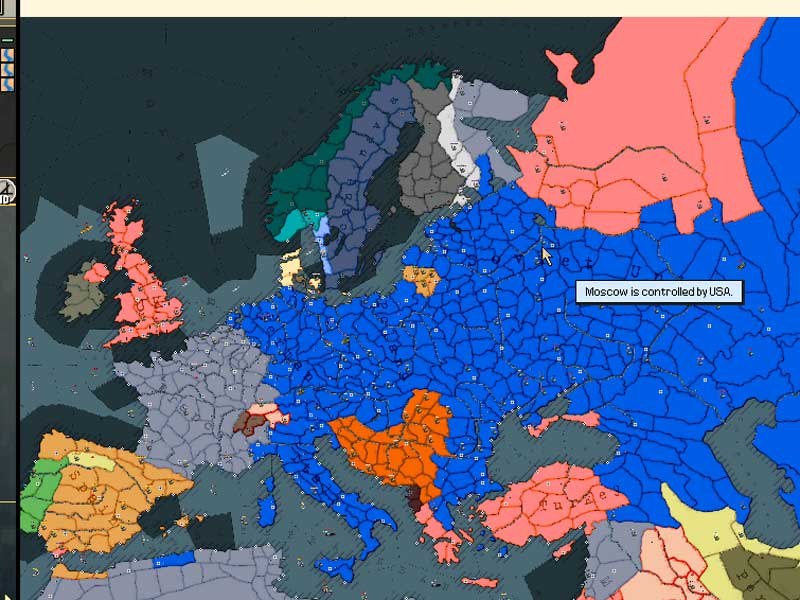
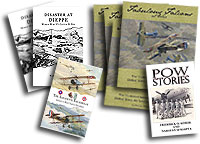


 French Military Victories...
French Military Victories...